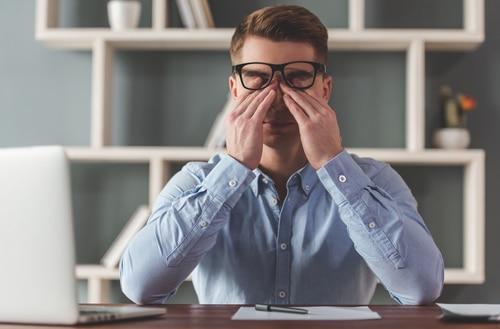
Most people experience dry eye symptoms one way or another throughout their lives. You likely have experienced some of these uncomfortable symptoms.
Dry eye symptoms can include itchy, burning, red eyes, a gritty feeling, and crusty mucus around your eyes. It can be a distracting or even painful way to go through your day.
What you may not be familiar with is why exactly it is happening. Keep reading to learn more about dry eye and what you can do if allergies give you dry eyes.
Causes of Dry Eye
Dry eye can result from many different sources and is often caused by a combination of them. Some of the causes of dry eye include:
Age
As you get older, your eyes may not produce enough tears to sustain healthy vision. This is part of the aging process, and common dry eye treatments can help with age-related dry eyes.
Lifestyle
Certain habits like smoking or excessive use of computer screens can cause dry eyes.
A Symptom of Disease
Dry eye can manifest as a symptom of diseases or medical conditions. Rheumatoid arthritis, lupus, thyroid disorders, or meibomian gland dysfunction can all cause dry eye.
A Side Effect of Medications
Dry eye can occur as a side effect of medications. Antidepressants, blood pressure medication, acne medication, or birth control can all lead to dry eyes.
Desensitized Corneal Nerves
Damage to the nerves in your cornea can occur due to injury, contact use, or surgery. If these nerves get damaged, your eye may not know it needs tears, resulting in dry eyes.
Environmental Factors
Climate, air quality, and airborne particles can physically dry out your eyes and cause dry eyes. Keep your home and office clean and increase the moisture in the air with a humidifier to reduce dry eye symptoms.
Allergies
Allergies are one of the most common causes of dry eye. Allergens like pollen, pet dander, and dust are common causes of dry eyes.
All these causes of dry eye fall into one of two categories. They either reduce the number of tears you produce or cause tears to evaporate faster than usual.
Fortunately, most problems are fixable with self-treatment and doctor-assisted treatment. There are, for example, several ways to limit dry eyes caused by allergies.
Managing Allergy-Induced Dry Eye
If allergies primarily cause your dry eye, then the first step is to reduce your exposure to allergens. Pollen is a prevalent allergen that often produces reactions in the eyes.
Closing your windows during the day can stop pollen from entering your home. Tracking pollen counts can help you limit your exposure when you go outside.
You should also clean your home frequently to collect any pet dander, dust, or other allergens that have accumulated. Use a wet cloth instead of a traditional duster to prevent stirring up the irritants.
An air purifier is also an excellent addition to your home. It will collect allergens from the air throughout the day and trap them in a filter.
Use eye drops for immediate relief from symptoms. They will not only rehydrate your eyes but will also flush out allergens.
Rubbing your eyes will not help the problem. In fact, rubbing your eyes can make it worse and damage your eyes.
Oral allergy medication, or antihistamines, can help keep your allergies under control. But they may cause dry eye as a side effect, so use them only as needed.
Ready to discover the root cause of your dry eyes? Schedule an appointment at Colorado Eye Consultants in Littleton, CO, to learn more about your dry eye and find out how you can treat it!

